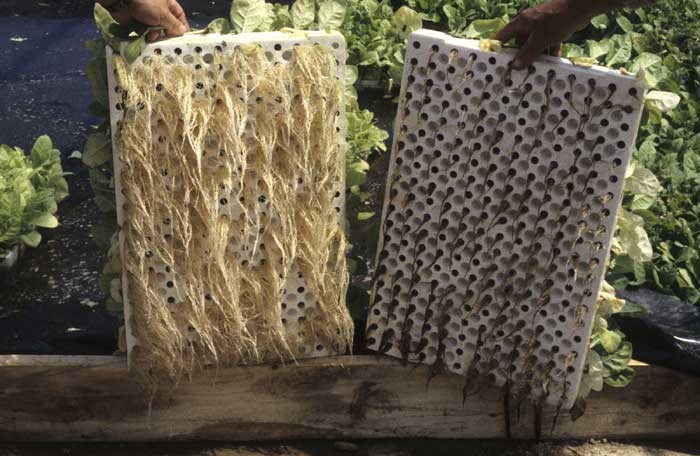Olpidium on Leafy Greens
Olpidium species, particularly Olpidium brassicae and Olpidium virulentus, are significant pathogens in greenhouse environments due to their ability to act as vectors for plant viruses and their direct pathogenic effects on plant roots. Here’s how Olpidium affects various leafy greens commonly grown in greenhouses:
Common Leafy Greens
Lettuce (Romaine, Butterhead, Leaf Lettuce)
- Big Vein Disease: Olpidium brassicae is a well-known vector for the Lettuce Big Vein Virus (LBVV) and Mirafiori Lettuce Big Vein Virus (MLBVV), which cause big vein disease in lettuce. This disease results in enlarged, clear veins and malformed leaves, making the lettuce unmarketable. The severity of the disease can vary with environmental conditions, being more prevalent in cool, wet conditions typical of greenhouses.
- Root Rot: Olpidium brassicae can also cause direct root infections, leading to poor nutrient uptake and stunted growth.

Spinach
- Virus Transmission: Olpidium virulentus has been noted to affect hydroponically-grown spinach by transmitting viruses such as LBVV and MLBVV, leading to reduced yields and quality.
- Root Health: Direct infection by Olpidium can cause root browning and rot, impacting the overall health and growth of spinach plants.

See how Healthy Hydroponics use Multiplex to help growers make decisions
Other Leafy Greens
Kale
- Virus Vector: While specific data on kale is limited, Olpidium species can potentially transmit viruses that affect other Brassica crops, leading to similar issues in kale.
- Root Disease: Direct infection can cause root rot and stunted growth, similar to leafy greens.
Swiss Chard
- Virus Transmission: Swiss chard, like other leafy greens, can be affected by viruses transmitted by Olpidium species, although specific viruses affecting chard are less documented.
- Root Rot: Direct infection by Olpidium can lead to root rot, affecting plant health and yield.
Arugula
- Virus Vector: Arugula, being a cruciferous vegetable, can be susceptible to viruses transmitted by Olpidium species, although specific instances are less documented.
- Root Health: Direct infection can cause root issues, impacting growth and yield.
Mustard Greens
- Virus Transmission: Mustard greens can be affected by viruses transmitted by Olpidium, similar to other Brassica crops.
- Root Disease: Direct infection can lead to root rot and reduced plant vigor.
Collard Greens
- Virus Vector: Collard greens can be susceptible to viruses transmitted by Olpidium species, affecting plant health and yield.
- Root Health: Direct infection can cause root rot, impacting overall growth.
Mizuna
- Virus Transmission: Mizuna, being a type of mustard green, can be affected by viruses transmitted by Olpidium species.
- Root Disease: Direct infection can lead to root rot and stunted growth.
Watercress
- Virus Vector: Watercress can be affected by viruses transmitted by Olpidium species, although specific instances are less documented.
- Root Health: Direct infection can cause root issues, impacting growth and yield.
Endive
- Virus Transmission: Endive can be susceptible to viruses transmitted by Olpidium species, affecting plant health and yield.
- Root Disease: Direct infection can lead to root rot, impacting overall growth.
Bok Choy
- Virus Vector: Bok choy, being a cruciferous vegetable, can be susceptible to viruses transmitted by Olpidium species.
- Root Health: Direct infection can cause root rot, impacting growth and yield.
Tatsoi
- Virus Transmission: Like other Brassica crops, Tatsoi can be affected by viruses transmitted by Olpidium species.
- Root Disease: Direct infection can lead to root rot and stunted growth.
Mâche (Corn Salad)
- Virus Vector: Mâche can be susceptible to viruses transmitted by Olpidium species, although specific instances are less documented.
- Root Health: Direct infection can cause root issues, impacting growth and yield.
Microgreens (Radish, Broccoli, Sunflower)
- Virus Transmission: Microgreens can be affected by viruses transmitted by Olpidium species, impacting their rapid growth cycles.
- Root Disease: Direct infection can lead to root rot, affecting microgreens’ overall health and yield.
Herbs (Basil, Cilantro, Parsley, Mint)
- Virus Vector: Herbs can be susceptible to viruses transmitted by Olpidium species, although specific instances are less documented.
- Root Health: Direct infection can cause root issues, impacting growth and yield.

Management Strategies
To mitigate the impact of Olpidium in greenhouses, the following strategies can be employed:
- Water Treatment: Treating irrigation water to eliminate zoospores using methods like slow sand filtration and surfactants.
- Monitoring and Early Detection: Regular monitoring of irrigation water and early detection of pathogens using advanced techniques.
- Cultural Practices: Maintaining clean water sources, avoiding the reuse of contaminated water, and implementing good sanitation practices.
- Biological Control: Using disease-suppressive bacteria to induce resistance in plants.
In summary, Olpidium species pose a significant threat to leafy greens in greenhouses by acting as vectors for plant viruses and causing direct root infections. Effective management strategies are essential to mitigate their impact on crop health and yield.
Must Read:
- https://ceimperial.ucanr.edu/Plant_Pathology_88/
- https://ipm.ucanr.edu/agriculture/lettuce/big-vein/
- https://pubmed.ncbi.nlm.nih.gov/30722639/
- https://extension.okstate.edu/fact-sheets/diseases-of-leafy-crucifer-vegetables.html
- https://ephytia.inra.fr/en/C/11054/Tobacco-Olpidium-brassicae
Banner image from: https://ephytia.inra.fr/en/C/11054/Tobacco-Olpidium-brassicae
![]()
David Santos is the CMO of Healthy Hydroponics InnoTech




